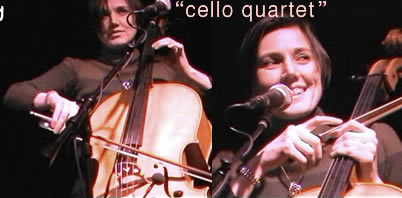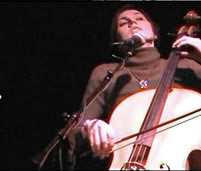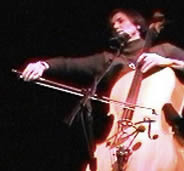 |
||||
 |
 |
|||
A Conversation with Stephanie Winters (continued)
PM: How about "Precious Lord, Take My Hand"?
SW: It was right at the tail end of the record, and I was driving home really late at night on Martin Luther King Day. I was living in Boston at the time. I remember it was freezing cold, it was like midnight. And they were replaying the programming. So they had Mahalia Jackson singing "Precious Lord," because it was Martin Luther King Day. And I was like, "Oh, my God, if I could try to play the way she sings, wouldn't that be amazing."
I called up Alan and said, "I know this might just sound really weird, but I want to do 'Precious Lord.'" And he was into the idea, he thought it would be cool. But it was really hard to get a recording. Actually, I couldn't find one in print. And I ended up ordering a cassette through Barnes & Noble, thank God, like they hadn't thrown them all in the dumpster, they still have old cassettes. So I ordered the cassette. And Alan, I think, got the recording from the library. And he did that arrangement, which I think is stunning. And I really worked at trying to play that like she could sing it, and I couldn't do it. But it definitely is not straight classical.
PM: Hardly. No, it's got spiritual and gospel overtones, oh yeah, absolutely.
SW: And a little Copeland.
[laughter]
SW: Then there's "November," which is just a little two-minute instrumental that I wrote.
PM: It's very pretty.
SW: I woke up one morning and I was singing that in my head, and I just decided to write it down. I wasn't sure it was even going to be a keeper, but then it just sort of seemed like a nice little palette cleanser to break up all the multitracking.
And the Bartok pieces I played as a child. I just love them--they were one of the reasons I wanted to play the cello. They were the first intelligent music I ever played as a beginning cellist. And they're so deep. They're originally for violin, but they're published for cello. And I remember playing them in fourth grade and I knew that was the shit. I just knew that was it.
PM: Wow, in fourth grade you knew.
SW: Including them seemed sort of wacky, but I don't think they've ever been recorded, or I don't know of them being recorded. So we picked out three of them. A lot of this stuff I'm playing freely without a click. And to multitrack it and play along with myself without a click--I got really good at it, but you have to be a little psychic.
PM: Extremely tricky without a click. [A click track is a metronome or some sound in time that's only in your headphones, that probably won't be on the track when it's mixed, it's just to keep strict tempo while one is recording. So if one slowed down or sped up ever so slightly, and one is "doubling" or playing the same track again along with the last one to thicken the sound up, to play it exactly the same way takes a grand intuition and a very careful ear-to-hand coordination.]
SW: Yeah. Some of it was with click--like Alan notated the Bulgarian Women's Choir piece, and all the measures were like 7/8, 12/8, 11/8, because we built the rubatos into the timing so there would be an even click. It doesn't sound like it. And that was maddening, because every measure was changing meter. At first we tried to have the cellos be exactly the same. In the end I was actually using two different cellos, and it was better to mix it up. If you have two cellos, there can be a chorusing effect [where one part is microtonally different than the last, it can sound a little wobbly], but three sounds better. And it matters, of course, how much vibrato you use, all these things... I've learned a lot just through trial and error.
PM: Wow. Now, how are you going to support this record? Do you like to gig solo? Do you gig solo at all?
SW: It's completely new for me to gig solo. And I'm totally into figuring that out. I'm working with an engineer and guitarist named Jody Elff. He's a sound artist, and the sound engineer for Laurie Anderson. And he works with the Bang on a Can people, which is the new music movement in New York. And then he also works with Paul Winter, and Tan Dun, a composer whom I believe wrote the music Yo-Yo Ma plays for the Crouching Tiger, Hidden Dragon soundtrack.
PM: Right. Ever meet him?
SW: Yo-Yo Ma or Tan Dun?
PM: Yo-Yo Ma.
SW: Yes, I've met Yo-Yo Ma [laughs] a couple times.
PM: Was he nice?
SW: You know, he's the most charming soul on earth, I think.
PM: Did you get to play for him?
SW: No. I did give him a copy of my album, and I was disappointed not to hear anything back. It was just a home copy because it wasn't finished yet. I actually went to a book signing so that I could give him my album. Maybe he lost it or never listened to it, or maybe he listened to it and never contacted me, I don't know. But I will forever have a great appreciation for the act of asking for someone's autograph, because it was one of the hardest things I ever did. I'd never really asked anyone for an autograph like that. I've done it as a peer, like when I've shared a bill with someone, I've certainly asked them to sign their CD. But it's really different when you're totally anonymous, waiting in a line of 200 people to get Yo-Yo Ma's autograph. I felt so humbled. It just felt very weird to me.
PM: It is.
SW: And I thought, "If anyone ever asks me for my autograph, I'm going to have so much more empathy for them." So that's what I got out of asking Yo-Yo Ma, was how hard it is to ask someone for an autograph, or how hard it was for me.
PM: Don't worry. A lot of people are going to ask you for your autograph.
SW: [laughs] Okay.
PM: A lot of them. [laughs]
SW: Well, Yo-Yo Ma was very nice. "Oh, you're a cellist, that's great." He made me feel as comfortable as he could, but there's another hundred people waiting to get his attention, so it was all of probably thirty seconds.
PM: Right. You know, I believe that this record you've done can reach a huge number of people.
SW: Thank you. I hope so.
PM: It's still only the beginning of that outreach. I can't imagine how one pushes a classical crossover out there, but I hope that some of us will be some help to you figuring that out.
SW: Maybe we can have another conversation when you get to New York and brainstorm a little. Because I think Alan had a great sense of hitting a lot of different marks with this. He worked in a video and record store as his day job when he was trying to survive with his band. Now he's a musicologist and obviously a great intellect and trained musician. But I think all those different things came together in the way this album sits between new music and classical and even folk.
PM: I agree.
SW: Bartok was tremendously influenced by folk music. And there's the "Cancao," the Bulgarian, my brother's piece. "Precious Lord" was a gospel tune. So there's kind of a folk underpinning, at least on a spiritual level.
PM: I agree completely.
SW: And I think that's where it sort of relates to my whole singer songwriter sensibility, and to teaching guitar for six years at the New School, like strumming Beatles tunes for hours a day, and then touring, playing people's songs. The song paradigm is really in my bone marrow now.
PM: For a classically trained cellist, you're definitely a song person.
SW: Yes. Songs are very natural for me. And I think Alan really wanted to make something that was sophisticated and interesting to musicians yet was also of the people. That's something I've always valued--it's really important for me for things to be accessible.
PM: And it's this latter quality that I'm so excited about, because I think Through the Storm is very successfully every person. And that's what's really shocking about it. continue
print (pdf) listen to clips puremusic home